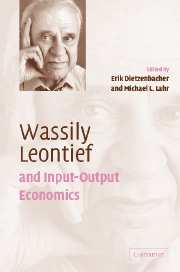Book contents
- Frontmatter
- Contents
- List of contributors
- List of figures
- List of tables
- Preface
- Part I Reflections on input-output economics
- Part II Perspectives of input-output economics
- 10 A neoclassical analysis of total factor productivity using input-output prices
- 11 What has happened to the Leontief Paradox?
- 12 The decline in labor compensation's share of GDP: a structural decomposition analysis for the United States, 1982 to 1997
- 13 An oligopoly model in a Leontief framework
- 14 Economies of plant scale and structural change
- 15 Technological change and accumulated capital: a dynamic decomposition of Japan's growth
- 16 Japan's economic growth and policy-making in the context of input-output models
- 17 Contributions of input-output analysis to the understanding of technological change: the information sector in the United States
- 18 How much can investment change trade patterns? An application of dynamic input-output models linked by international trade to an Italian policy question
- 19 Social cost in the Leontief environmental model: rules and limits to policy
- Subject index
- Author index
13 - An oligopoly model in a Leontief framework
Published online by Cambridge University Press: 22 September 2009
- Frontmatter
- Contents
- List of contributors
- List of figures
- List of tables
- Preface
- Part I Reflections on input-output economics
- Part II Perspectives of input-output economics
- 10 A neoclassical analysis of total factor productivity using input-output prices
- 11 What has happened to the Leontief Paradox?
- 12 The decline in labor compensation's share of GDP: a structural decomposition analysis for the United States, 1982 to 1997
- 13 An oligopoly model in a Leontief framework
- 14 Economies of plant scale and structural change
- 15 Technological change and accumulated capital: a dynamic decomposition of Japan's growth
- 16 Japan's economic growth and policy-making in the context of input-output models
- 17 Contributions of input-output analysis to the understanding of technological change: the information sector in the United States
- 18 How much can investment change trade patterns? An application of dynamic input-output models linked by international trade to an Italian policy question
- 19 Social cost in the Leontief environmental model: rules and limits to policy
- Subject index
- Author index
Summary
Introduction
The price dual in the Leontief input-output system has played the Cinderella role in practical applications of the model. This results largely from the necessity of using the US dollar as the homogeneous unit of aggregation for inputs and outputs of sectors containing quite diverse products. Prices are assumed fixed and are used, therefore, to convert naturally calibrated input coefficients to cents' worth of input per dollar's worth of output, effectively neutralizing the price dual as an analytical tool. The “dollar's worth” is a homogeneous physical unit for all goods as long as prices do not change. Of course, the choice of this unit masks the heterogeneity of the natural physical units of the sectoral outputs, given the wide variety of products aggregated in the sectors of even the largest input-output models. Constant prices are “virtual” prices of a conglomerate of disparate sectoral products. But, in empirical and theoretical applications of the output primal, the values of outputs and inputs are meaningful units in short-run periods of stable prices and product mixes. They are operationally interpretable.
This analytical device can be used only if the gross output primal model is independent of the price dual. Constant returns to scale, perfect complementarity of inputs in infinitely elastic supply, and exogenization of the bill of final goods achieve this prerequisite. Gross output vectors cannot affect prices and the “dollar's worth” metric of the output primal is defensible.
- Type
- Chapter
- Information
- Wassily Leontief and Input-Output Economics , pp. 213 - 231Publisher: Cambridge University PressPrint publication year: 2004
- 3
- Cited by



